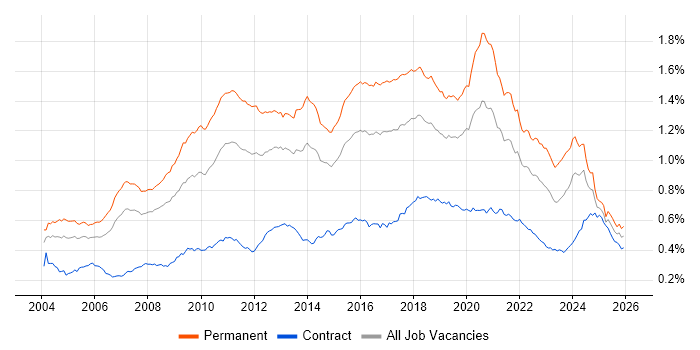Lead Developer
UK
The median Lead Developer salary in the UK is £80,000 per year, according to job vacancies posted during the 6 months leading to 5 March 2026.
The table below compares current salary benchmarking and summary statistics with the previous two years.
| 6 months to 5 Mar 2026 |
Same period 2025 | Same period 2024 | |
|---|---|---|---|
| Rank | 308 | 375 | 267 |
| Rank change year-on-year | +67 | -108 | +26 |
| Permanent jobs requiring a Lead Developer | 439 | 326 | 883 |
| As % of all permanent jobs in the UK | 0.61% | 0.71% | 1.12% |
| As % of the Job Titles category | 0.67% | 0.78% | 1.19% |
| Number of salaries quoted | 372 | 251 | 800 |
| 10th Percentile | £58,875 | £47,000 | £53,750 |
| 25th Percentile | £70,000 | £55,000 | £61,250 |
| Median annual salary (50th Percentile) | £80,000 | £68,525 | £75,000 |
| Median % change year-on-year | +16.75% | -8.63% | -6.25% |
| 75th Percentile | £100,000 | £83,750 | £95,000 |
| 90th Percentile | £142,500 | £98,750 | £115,000 |
| UK excluding London median annual salary | £71,000 | £65,000 | £67,500 |
| % change year-on-year | +9.23% | -3.70% | -3.57% |
All Permanent IT Job Roles
UK
For comparison with the information above, the following table provides summary statistics for all permanent IT job vacancies. Most job vacancies include a discernible job title that can be normalized. As such, the figures in the second row provide an indication of the number of permanent jobs in our overall sample.
| Permanent vacancies in the UK with a recognized job title | 65,777 | 41,647 | 74,342 |
| % of permanent jobs with a recognized job title | 91.60% | 91.11% | 94.66% |
| Number of salaries quoted | 41,594 | 22,804 | 57,442 |
| 10th Percentile | £29,750 | £32,500 | £28,500 |
| 25th Percentile | £38,250 | £45,000 | £39,073 |
| Median annual salary (50th Percentile) | £55,000 | £60,000 | £55,000 |
| Median % change year-on-year | -8.33% | +9.09% | -8.33% |
| 75th Percentile | £75,000 | £80,000 | £72,624 |
| 90th Percentile | £95,000 | £100,000 | £92,500 |
| UK excluding London median annual salary | £50,000 | £55,000 | £50,000 |
| % change year-on-year | -9.09% | +10.00% | -5.66% |
Lead Developer
Job Vacancy Trend
Historical trend showing the proportion of permanent IT job postings featuring 'Lead Developer' in the job title relative to all permanent IT jobs advertised.

Lead Developer
Salary Trend
Salary distribution trend for Lead Developer job vacancies in the UK.

Lead Developer
Salary Histogram
Salary distribution for jobs citing Lead Developer over the 6 months to 5 March 2026.
Lead Developer
Top 17 Job Locations
The table below looks at the demand and provides a guide to the median salaries quoted in IT jobs citing Lead Developer within the UK over the 6 months to 5 March 2026. The 'Rank Change' column provides an indication of the change in demand within each location based on the same 6 month period last year.
| Location | Rank Change on Same Period Last Year |
Matching Permanent IT Job Ads |
Median Salary Past 6 Months |
Median Salary % Change on Same Period Last Year |
Live Jobs |
|---|---|---|---|---|---|
| England | +66 | 409 | £80,000 | +16.75% | 103 |
| UK excluding London | +50 | 245 | £71,000 | +9.23% | 97 |
| Work from Home | +83 | 221 | £80,000 | +14.29% | 86 |
| London | +63 | 164 | £100,000 | +30.29% | 24 |
| North of England | -14 | 79 | £70,500 | +28.18% | 26 |
| North West | -2 | 61 | £70,000 | +27.27% | 20 |
| South East | +9 | 58 | £88,750 | +10.94% | 20 |
| South West | -3 | 44 | £65,000 | +13.04% | 10 |
| Midlands | +15 | 42 | £75,000 | +59.57% | 18 |
| West Midlands | +8 | 26 | £74,500 | +58.51% | 12 |
| East of England | +16 | 17 | £65,000 | -18.75% | 11 |
| East Midlands | -12 | 16 | £75,000 | +9.09% | 5 |
| Yorkshire | -30 | 16 | £78,750 | +16.67% | 4 |
| Scotland | -16 | 2 | £71,250 | +9.62% | 6 |
| North East | -18 | 2 | £68,500 | +14.41% | 2 |
| Wales | -18 | 2 | £75,000 | - | 4 |
| Northern Ireland | -32 | 1 | £95,000 | +40.74% | 4 |
Lead Developer Skill Set
Top 30 Co-Occurring Skills & Capabilities
For the 6 months to 5 March 2026, Lead Developer job roles required the following skills and capabilities in order of popularity. The figures indicate the absolute number of co-occurrences and as a proportion of all permanent job ads featuring Lead Developer in the job title.
|
|
Lead Developer Skill Set
Co-Occurring Skills & Capabilities by Category
The following tables expand on the one above by listing co-occurrences grouped by category. They cover the same employment type, locality and period, with up to 20 co-occurrences shown in each category:
|
|
||||||||||||||||||||||||||||||||||||||||||||||||||||||||||||||||||||||||||||||||||||||||||||||||||||||||||||||||||||||||||||||
|
|
||||||||||||||||||||||||||||||||||||||||||||||||||||||||||||||||||||||||||||||||||||||||||||||||||||||||||||||||||||||||||||||
|
|
||||||||||||||||||||||||||||||||||||||||||||||||||||||||||||||||||||||||||||||||||||||||||||||||||||||||||||||||||||||||||||||
|
|
||||||||||||||||||||||||||||||||||||||||||||||||||||||||||||||||||||||||||||||||||||||||||||||||||||||||||||||||||||||||||||||
|
|
||||||||||||||||||||||||||||||||||||||||||||||||||||||||||||||||||||||||||||||||||||||||||||||||||||||||||||||||||||||||||||||
|
|
||||||||||||||||||||||||||||||||||||||||||||||||||||||||||||||||||||||||||||||||||||||||||||||||||||||||||||||||||||||||||||||
|
|
||||||||||||||||||||||||||||||||||||||||||||||||||||||||||||||||||||||||||||||||||||||||||||||||||||||||||||||||||||||||||||||
|
|
||||||||||||||||||||||||||||||||||||||||||||||||||||||||||||||||||||||||||||||||||||||||||||||||||||||||||||||||||||||||||||||
|
|||||||||||||||||||||||||||||||||||||||||||||||||||||||||||||||||||||||||||||||||||||||||||||||||||||||||||||||||||||||||||||||
